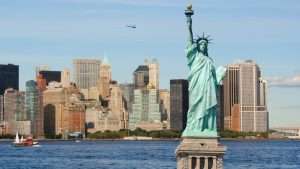The Volokh Conspiracy
Mostly law professors | Sometimes contrarian | Often libertarian | Always independent
Forty-Five Years in America
Today is the 45th anniversary of the Somin family's arrival in America.

In addition to being the 80th anniversary of D-Day, today is the 45th anniversary of the Somin family's arrival in America! I wrote about our experience of immigration from the Soviet Union to the United States in a 2010 memoir, written for the Hebrew Immigrant Aid Society (HIAS), which helped us gain admission to the US, and continues to assist refugees from around the world, to this day.
Reflecting on this experience, I am profoundly grateful to my parents for making the decision to come to the US, and also to those who fought at D-Day, Gettysburg, and elsewhere to establish, expand, and protect the freedoms that make America a haven for immigrants seeking liberty and opportunity from around the world.
Reflection also inspires humility. I am vastly better off than my peers who remained in Russia. But virtually all of that difference is the result of the difference between American institutions and Russian ones, not any merit of mine. Over the last two years, that difference has been accentuated by the Putin regime's horrific war of aggression against Ukraine, and the accompanying repression. We should strive to ensure that more people are able to enjoy liberty and opportunity unconstrained by arbitrary circumstances of ancestry and place of birth.
At its worst, America is susceptible to the same types of ethnic, religious, racial, and nationalistic prejudices as all too many other nations. Sadly, a dangerous illiberal nationalism is increasingly influential in our politics.
But at its best, this is the nation where freedom and opportunity can be yours regardless of who your parents are, or where you were born; the nation where immigrants are accepted more fully than in almost any other. It is difficult to gain full acceptance as a Frenchman, German, or Japanese if you are not a native-born member of the majority ethnic group in those countries. Not so here; or at least far less so.
And America is also a nation where many thousands of ordinary people work to welcome refugees from war and oppression. We have recently seen that with those who have stepped forward to support migrants from Ukraine, Cuba, Venezuela, and elsewhere under private sponsorship programs like Uniting for Ukraine, CNVH, and Welcome Corps.
In 2022, a newly arrived Ukrainian refugee told me she chose America because it is the nation where there are people from many backgrounds and all are "equal … regardless of nationality, skin color or religion." Her words reminded me of those of George Washington, who envisioned the US as "an Asylum for the poor and oppressed of all nations and religions." Too often, we fall short of these high ideals. But great things happen when we live up to them.
It is fashionable to assume that only people who are themselves members of a particular identity group can truly understand its experience. If so, perhaps only immigrants can fully grasp the value of immigration. Thus, some readers may assume that my work on "voting with your feet," migration rights, and the perils of nationalism is an outgrowth of personal experience.
But, in truth, it began with my engagement with the political economy literature on federalism (which helped me grasp the importance of domestic foot voting). Later, the writings of scholars such as Bryan Caplan, Michael Clemens, and Joseph Carens, helped me see that international migration is an even more significant pathway to expanding human freedom and opportunity; not just one liberty among many, but one of the great issues of our time. To my knowledge, all of them are themselves native-born citizens of western liberal democracies. Yet it was they who enlightened me about the broader significance of migration rights, rather than vice versa. They saw clearly where I long had a blind spot.
It is a small, but telling example of how understanding often comes through logic and evidence, not just personal experience accessible only to members of a particular group. It also offers a measure of hope that we can expand liberty for both immigrants and natives with the help of many who never personally experienced the injustices they seek to end.
NOTE: This post updates and expands one I published in 2019, on the 40th anniversary of the same event.



Show Comments (8)